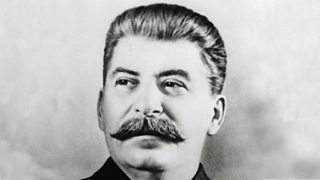Which Former Adversary Of Animal Farm Is Seen Cajoling With Napoleon At The End Of The Book?
Characters
The characters in Animal farm tin can be separate into three groups - the humans, the pigs, and the other farm animals. Each group represents a different element of the Russian Revolution in 1917.
Napoleon in Animal Farm
Napoleon is a threatening and 'fierce looking' Berkshire boar . He is one of the three pigs that have Old Major's ideas and turn them into 'Animalism' - a system of idea that encourages the animals to insubordinate. He is not a gifted speaker but is known for getting his own style. He also manages to get the support of the sheep, he encourages them to chant '4 legs proficient, two legs bad' during debates, preventing others making their points.
He takes two litters of puppies from their mothers and brings them up himself. Once they accept grown up he uses them to take control of the subcontract. After he has done this, he and the other pigs start to break the 7 Commandments that the animals agreed to live by. He eventually becomes as much of a tyrant as Mr Jones ever was and exploits the other animals.
| How is Napoleon like this? | Show from the text | Analysis | |
|---|---|---|---|
| Threatening | The style Napoleon makes his betoken during meetings carries threat. | He said very quietly that the windmill was nonsense and that he brash nobody to vote for it, and promptly sabbatum downward again. | The sense of threat in the style Napoleon speaks 'very quietly', is sinister and menacing , at that place is a hint that he is planning something and he does not demand to raise his voice. |
| Hypocritical | Napoleon ofttimes contradicts himself or 'Animalism' in the messages he puts out through Squealer. | Napoleon announced that there would be work on Sunday afternoons as well. This work was strictly voluntary, only whatsoever animal that absented himself from it would have his rations reduced past half. | Napoleon uses the word 'voluntary', yet the fact that it will result in reduced rations means that there is no pick for the animals - he is contradicting himself . |
| Tyrant | Napoleon abuses his power to the point where he fifty-fifty kills some animals. | The dogs promptly tore their throats out, and in a terrible vox Napoleon demanded whether any other animal had anything to confess. | Napoleon has become a tyrant. He is capable of having his 'comrades' put to death to protect his position. When he 'demands' to know of more confessions we tin can imagine the other animals cowering in fear. |
Social and historical context

Napoleon is based on the Soviet dictator, Joseph Stalin. Stalin was involved in the Russian Revolution of 1917 and came to dominion Soviet Russian federation after the death of Vladimir Lenin in 1924.He ruled until his death in 1953. During his time in power, the state was gripped by famine and fearfulness, millions of people starved to decease and those who opposed him were imprisoned or killed.
The name also evokes the French military machine leader, Napoleon Bonaparte (1776-1821), who seized power after the French Revolution, crowned himself Emperor and ruled France until 1815.
Analysing the evidence
Napoleon himself was not seen in public as ofttimes as once a fortnight. When he did appear, he was attended by not simply his retinue of dogs but a black cockerel that marched in forepart of him and acted as a kind of trumpeter, letting out a loud 'cock-a-doodle-doo' before Napoleon spoke. Even in the farmhouse, it was said, Napoleon inhabited split apartments from the others.
- Question
-
Looking at this extract from the book, how does Orwell make Napoleon seem more tyrannical as the novel goes on?
-
How to analyse the quote:
'Napoleon himself was not seen in public as often as one time a fortnight. When he did appear, he was attended by non only his retinue of dogs but a black cockerel that marched in front end of him and acted as a kind of trumpeter, letting out a loud 'erect-a-putter-doo' before Napoleon spoke. Fifty-fifty in the farmhouse, it was said, Napoleon inhabited separate apartments from the others.'
- 'not seen in public' - this gives an ever-increasing air of mystery and distances him from the other animals.
- 'retinue of dogs' - a further sense of fear as the animals are aware of what the dogs accept done at Napoleon'south behest.
- 'black cockerel' - the blackness of the cockerel adds a sinister presence.
How to use this in an essay:
In the extract nosotros meet how Napoleon was 'not seen in public' . This will help to create an atmosphere of mystery around him, and it makes him seem dissimilar to the other animals. The use of the 'retinue of dogs ' and the 'black cockerel' adds a sense of fear to that mystery - the animals have seen the terrible acts that the dogs have committed on Napoleon'due south orders. The fact that the cockerel is 'black' gives it a sinister presence. All of these factors combine to make Napoleon seem more tyrannical.
Source: https://www.bbc.co.uk/bitesize/guides/zqxhn39/revision/3
Posted by: millerwifyin76.blogspot.com

0 Response to "Which Former Adversary Of Animal Farm Is Seen Cajoling With Napoleon At The End Of The Book?"
Post a Comment